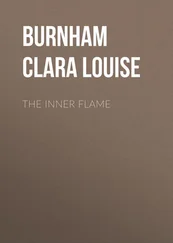1 ...6 7 8 10 11 12 ...16 Eliza's thin lips parted in a monosyllable of assent.
"What a wooden Indian!" thought Phil. Nevertheless, being a genial soul and having heard Miss Brewster's faithfulness extolled, he talked on: "We hear about New York streets being canyons. They are that, and the sky-line is amazing; but the noise, – great heavens, what a racket! and I can't seem to get a breath."
The young fellow rose restlessly, throwing back his shoulders, and paced the little room, filling it with his mountain stride.
Eliza Brewster watched him. She thought of her mistress, and the pride and joy it would have been to her to receive this six feet of manhood under her roof.
"She wouldn't 'a' kept her sentimental dreams long," reflected Eliza bitterly. "He'd 'a' hurt her, he'd 'a' stepped on her feelin's and never known it. He walks as if he had spurs on his boots." She steeled herself against considering him through Mrs. Ballard's eyes. "He's better-lookin' than the picture," she thought, "and I wouldn't trust a handsome man as far as I could see him. They haven't any business with beauty and it always upsets 'em one way or another – yes, every time."
Her eyes wandered to the mantelpiece whose bareness was relieved only by three varying sized pieces of blank paper. She felt the slightest quiver of remorse as she looked. She seemed to see her mistress's gentle glance filled with rebuke.
She stirred in her chair, folded her arms, and cleared her throat.
"You can leave the things here till I go, if you want to," she said.
Phil paused in his promenade and regarded her. Her manner was so unmistakably inimical that for the first time he wondered.
Perhaps, after all, she was not just a machine. And the same thought which had been entertained by Mrs. Fabian occurred to him.
"Twenty-five years of faithful service," he reflected. "I wonder if she expected the money? She's sore at me. That's a cinch."
Phil's artist nature grasped her standpoint in a flash. The granite face, with its signs of suffering, the loneliness, the poverty, all appealed to him to excuse her disappointment.
His eyes swept about the bare walls.
"Where are Aunt Mary's pictures?" he asked. "Was she too modest to hang them?"
"There were some up there," replied Eliza. "I took 'em down."
The visitor's quick eyes noted the white boards on the mantelpiece. With an unexpected movement, he strode across to it, and turned them around.
He stood in the same position for a space.
"Great guns, but she hates me!" he thought, while Eliza, startled, felt the shamed color stream up to her temples.
"What would Mrs. Ballard say!" was her guilty reflection.
Pluto here relieved the situation by making a majestic entrance. His jewel eyes fixed on the stranger for a moment with blinking indifference, then he proceeded, with measured tread, toward the haven of his mistress's lap.
"Hello, Katze," said Phil, stooping his scarlet face. He seized the creature by the nape of its neck and instantly the amazed cat was swung up to his broad shoulder, where it sat, claws digging into his coat and eyes glowering into his own.
"Say, charcoal would make a white mark on you, pussy," he went on, smoothing the creature in a manner which evidently found favor, for Pluto did not offer to stir.
"When I'm not doing her as Medusa," he reflected, "I'll paint her as a witch with this familiar. She'll only have to look at the artist to get the right expression."
"A distinguished visitor from the island of Manx, I suspect," he said aloud.
"No," returned Eliza, still fearfully embarrassed. "Pluto was born right here in New York."
The ever-ready stars in the visitor's eyes twinkled again into the green fire opposite them.
"It was his tail I was noticing. Manx cats are like that."
"Oh, that was boys. If I could 'a' caught 'em I'd 'a' liked to cut off their arms."
"I'll bet on that," thought Phil, "and their legs too."
Eliza cleared her throat. She seemed still to see the gentle eyes of her lost one rebuking her. With utter disregard of a future state she was preparing a lie.
"About those sketches," she said presently, and such was her hoarseness that she was obliged to clear her throat again, "you see, I was – sweepin', and I turned 'em to the wall."
"Oh, yes," said Phil, and continued to smooth Pluto who purred lustily. "A pretty good one for New England," he thought; and carelessly turning the third card about, he came face to face with his own photograph.
With one glance of disgust he tore the picture in two and threw it down.
Eliza started. "What did you do that for?" she demanded sharply.
Phil made a motion of impatience.
"Oh, it's so darned pretty!" he explained. "I thought all those pictures were in the fire."
"Mrs. Ballard set great store by that," said Eliza coldly, "and by the sketches, too," she added.
She was sitting up stiffly in her chair, now, and her gaze fixed on Phil, as, her cat on his shoulder singing loud praise of his fondling hand, he came and stood before her.
"I wish you'd let me see some of Aunt Mary's pictures," he said.
The dead woman's letter was against his heart. He felt that they were standing together, opposed to the hard, grudging face confronting him.
But this was Eliza's crucial moment. In spite of herself she feared in the depths of her heart that that which Mrs. Ballard had said was true; that this restless, careless boy had an artistic ability which her dear one had never attained. She shrank with actual nausea from his comments on her mistress's work. He might not say anything unkind, but she should see the lines of his mouth, the quiver of an eyelash.
She felt unable to rise.
"She left 'em all to me," she said mechanically, pale eyes meeting dark ones.
Phil brushed Pluto's ears and the cat sang through the indignity.
"Talk about the bark on a tree!" he thought. "I believe I'll paint her as a miser, after all! She'd be a wonder, with Pluto standing guard, green eyes peering out of the shadow."
He smiled down at Eliza, the curves of his lips stretching over the teeth she had admired.
"All right," he said. "I'm not going to take them away from you."
Eliza forced herself to her feet, and without another word slowly left the room.
Phil met the cat's blinking eyes where the pupils were dilating and contracting. "Katze, this place gives me the horrors!" he confided.
More than once on the train he had read over his aunt's letter, and each time her words smote an answering chord in his heart and set it to aching.
The present visit accentuated the perception of what her life had been. For a moment his eyes glistened wet against the cat's indolent contentment.
"I wish she hadn't saved any money, the poor little thing," he muttered. "No friends, no sympathy – nothing but that avaricious piece of humanity, calculating every day, probably, on how soon she would get it all. I'll paint her as a harpy. That's what I'll do. Talons of steel! That's all she needs." He heard a sound and dashed a hand across his eyes.
Eliza, heavy of heart, stony of face, entered, a number of pictures bound together, in her hands. The visitor darted forward to relieve her, and Pluto drove claws into his suddenly unsteady resting-place.
Eliza yielded up her treasures like victims, and stood motionless while Phil received them. Never had she looked so gaunt and grey and old; but the visitor did not give her a glance. Aunt Mary's letter was beating against his heart. Here was the work her longing hands had wrought, here the thwarting of her hopes.
His fingers were not quite steady as he untied the strings, and moving the easel into a good light placed a canvas upon it.
Eliza did not wish to look at him, but she could not help it. Her pale gaze fixed on his face in a torture of expectation, as he backed away from the easel, his eyes on the picture.
Читать дальше












